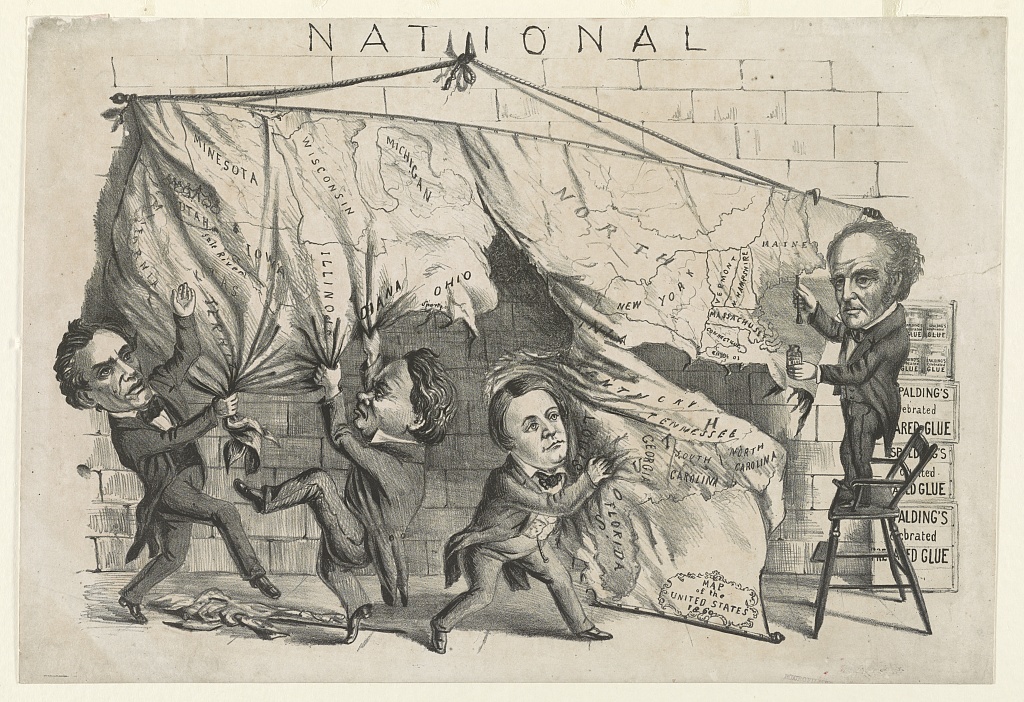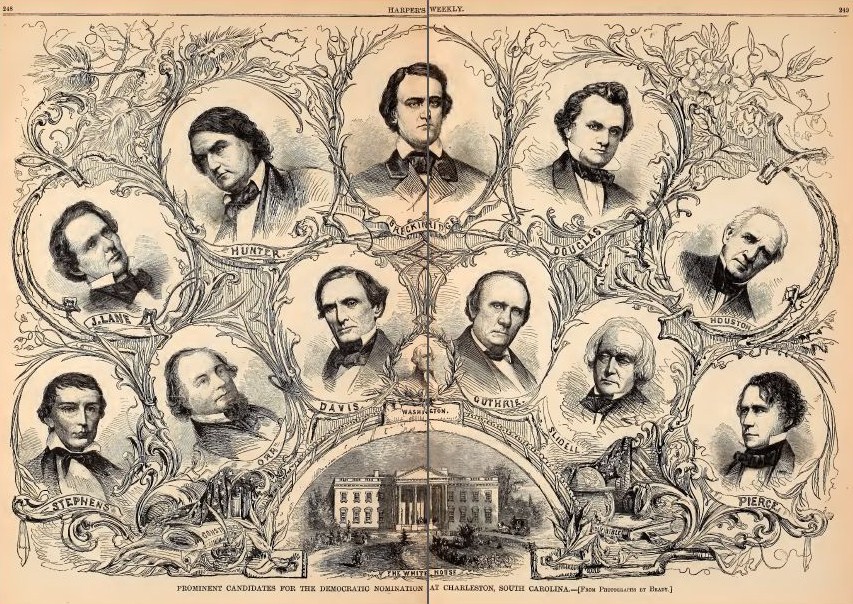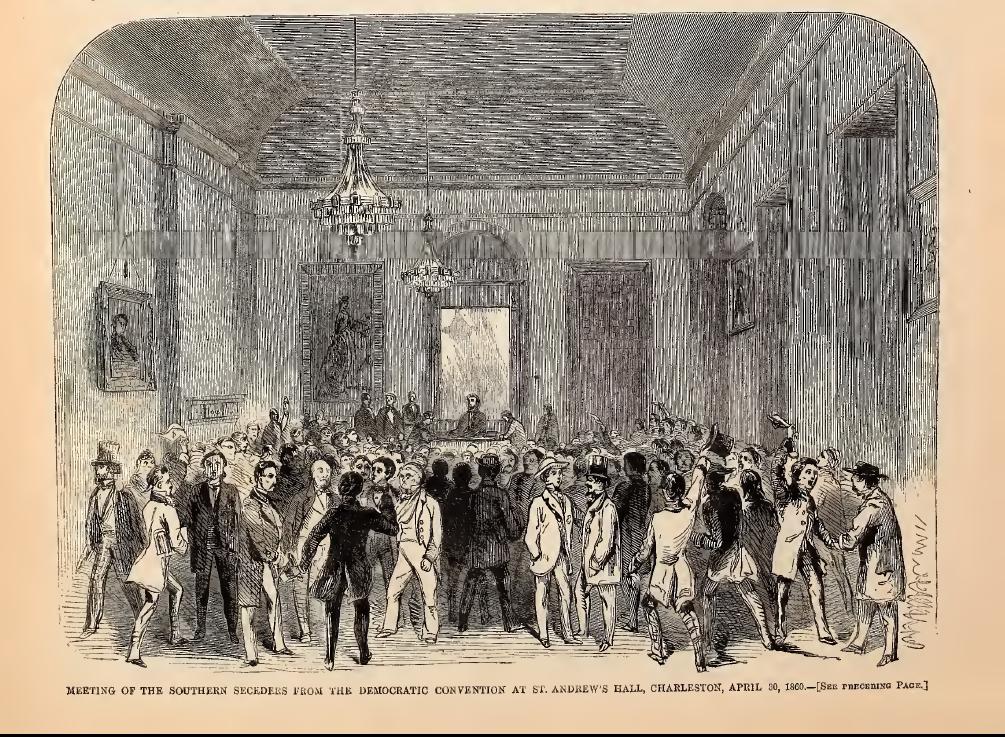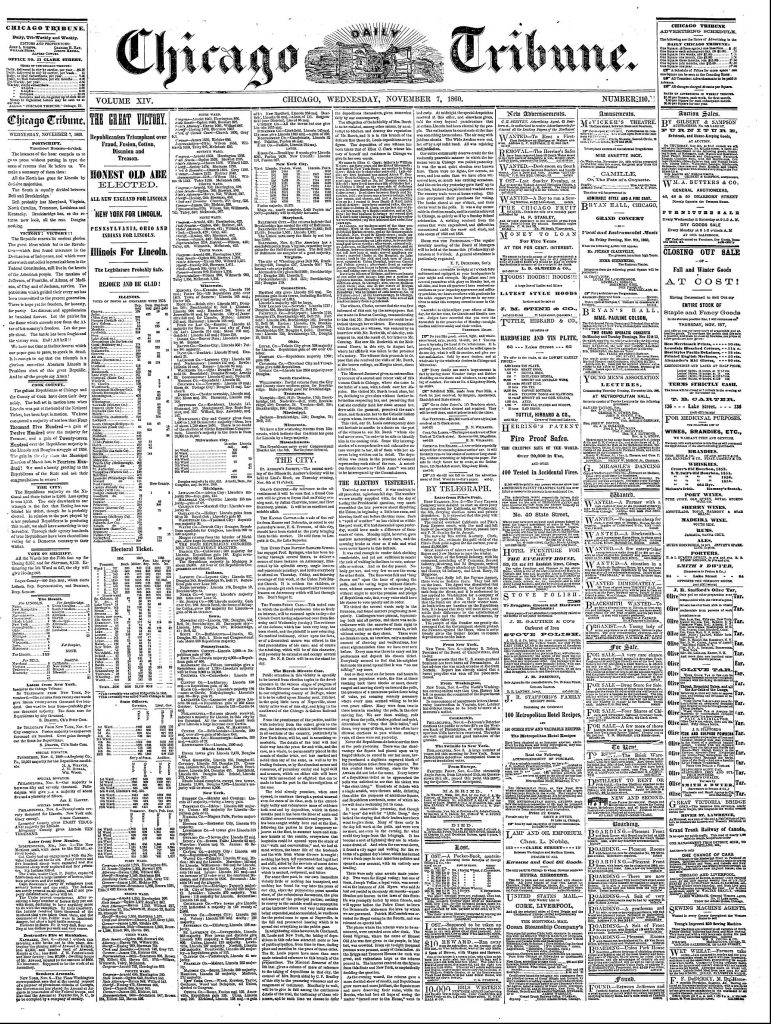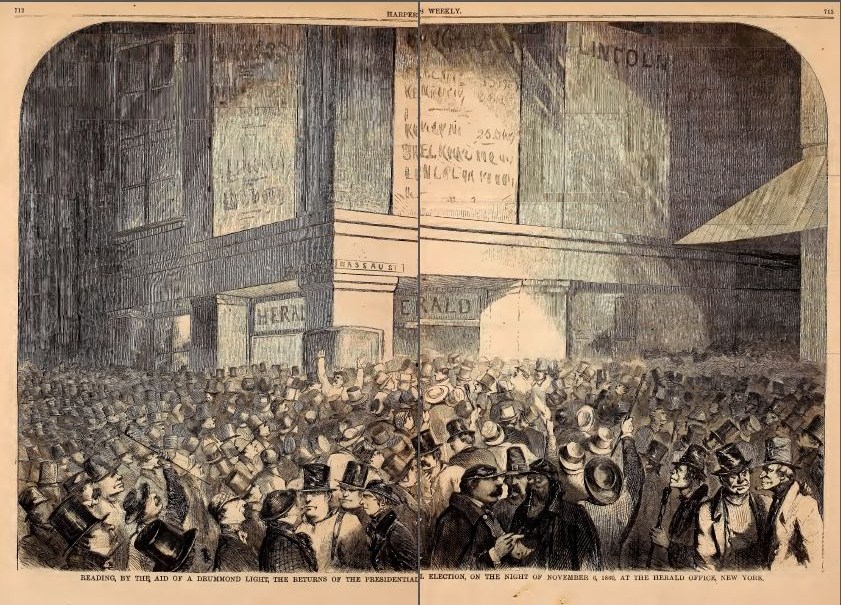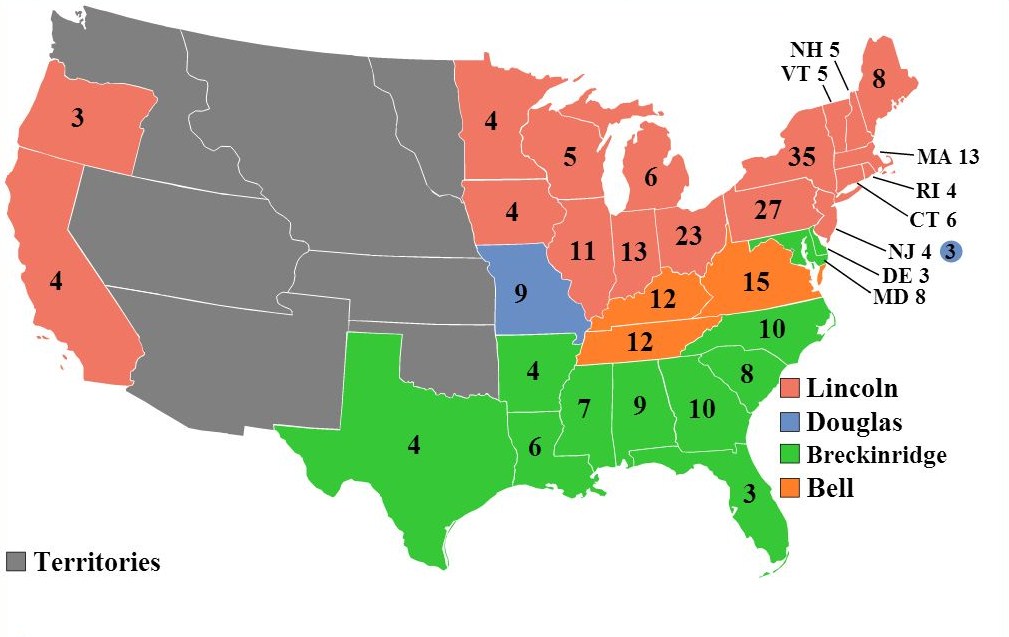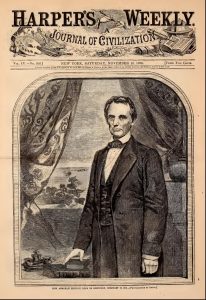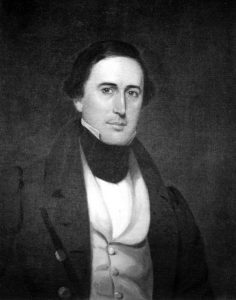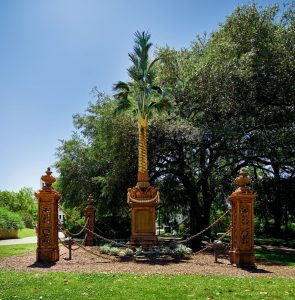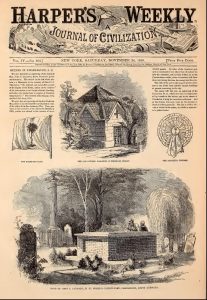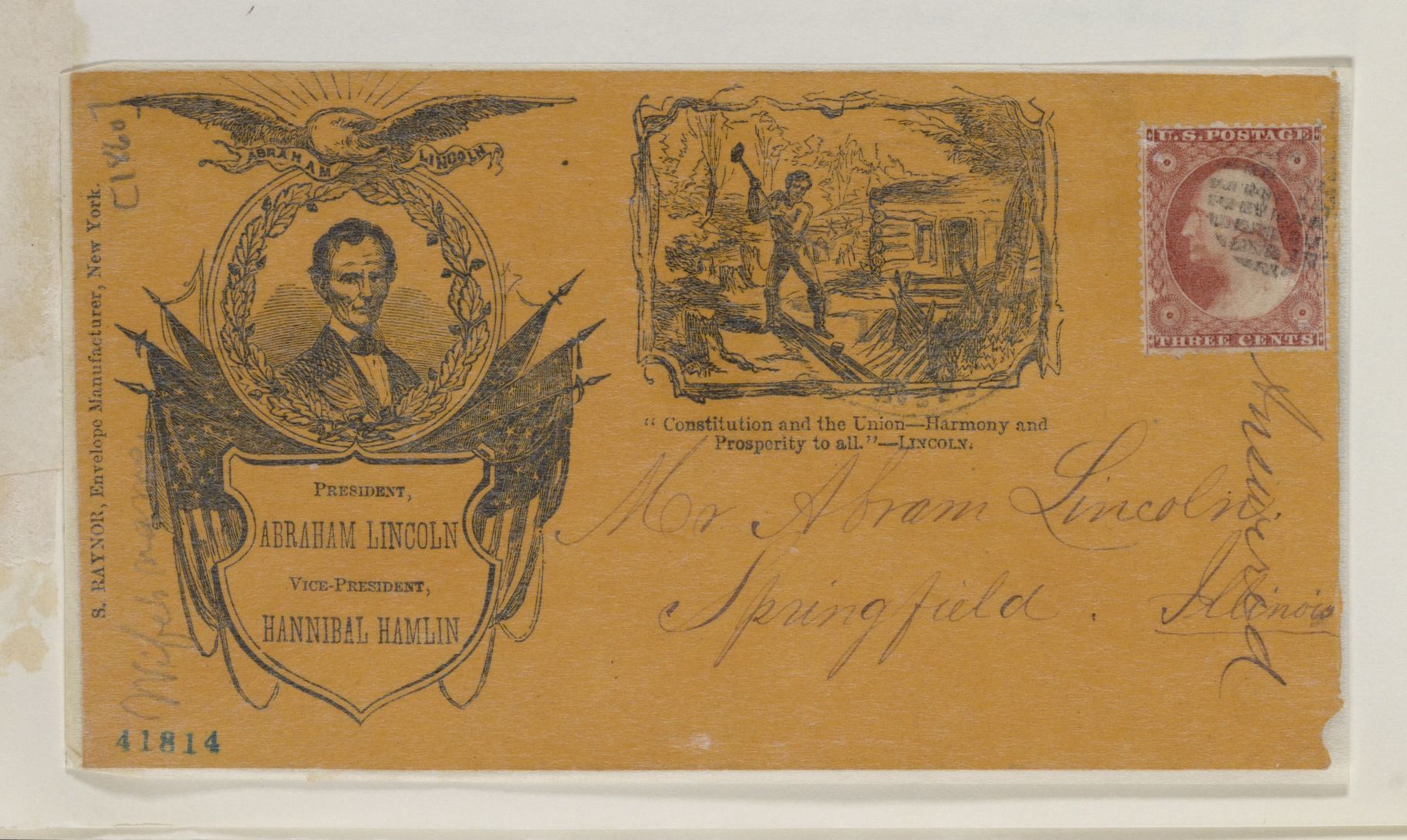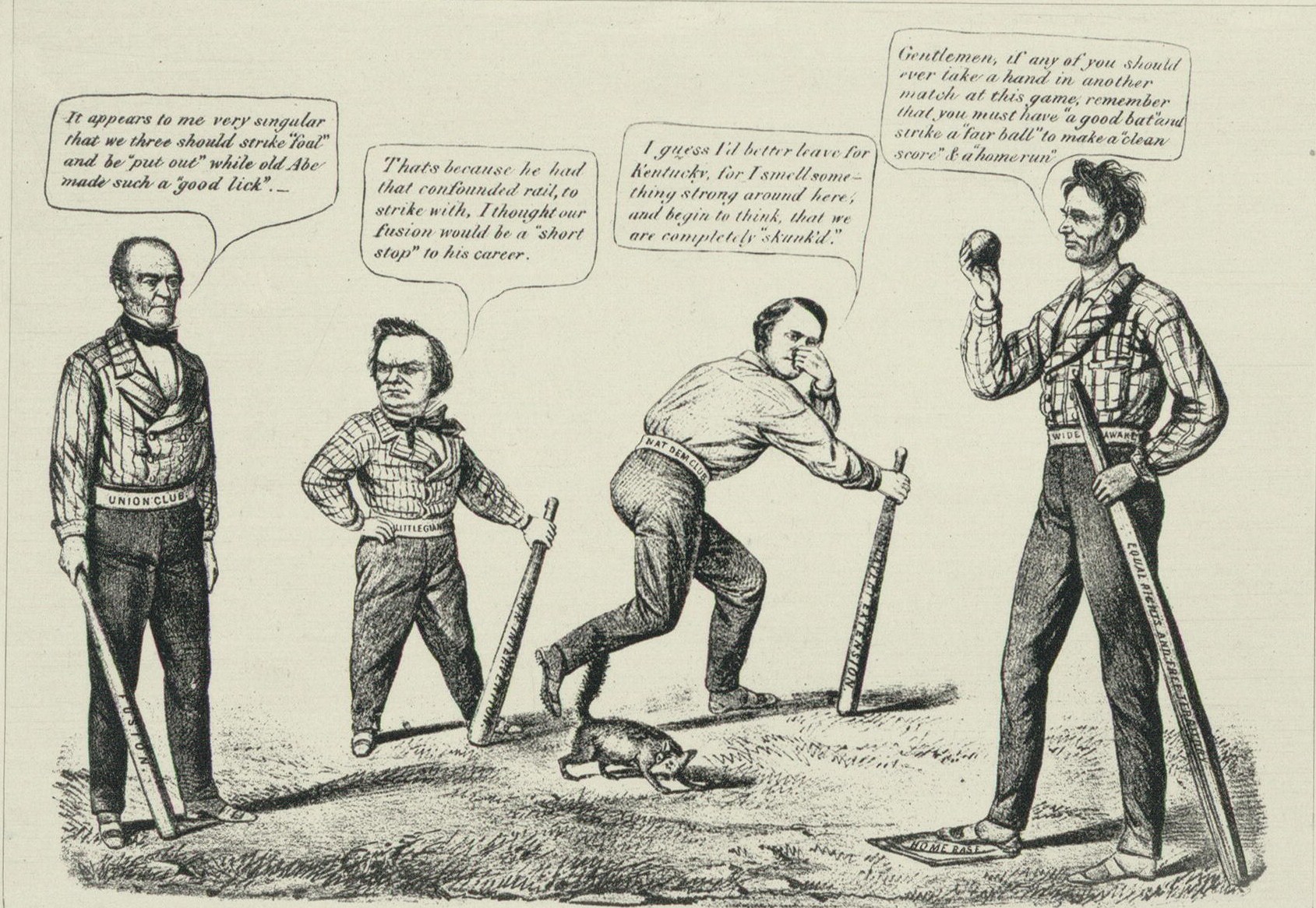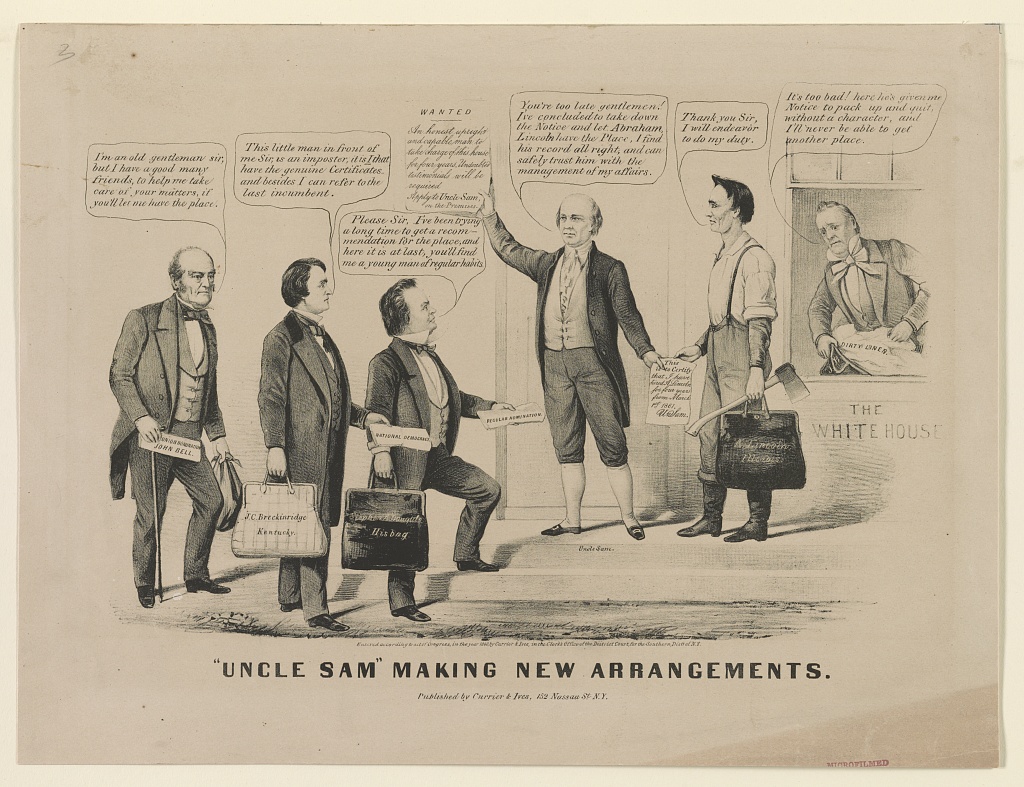160 years ago four different candidates divvied up the votes in the United States presidential election. Republican party candidate Abraham Lincoln won a plurality (about 40%) of the popular vote on November 6, 1860, but under the United States Constitution’s Electoral College that wasn’t the whole story. In 1860 most states were giving all their electoral college votes to the winner of the state’s popular vote. By this math Mr. Lincoln won almost 60% of the electoral college and was well on his way to being sworn in as the nation’s sixteenth president about four months later. The election was sectionally solid. Most of the south supported Southern Democratic candidate John C. Breckinridge; the north was solidly Republican; Stephen A. Douglas won the second most popular votes but came fourth in the electoral college. One of the reasons there were four candidates is because the Democratic party split. The party couldn’t agree on a candidate at its first convention in Charleston, South Carolina. A subsequent convention in Baltimore nominated Stephen A. Douglas. Southern Democrats didn’t like the popular sovereignty (territories could decide for themselves if they wanted slavery) espoused by Douglas and nominated Breckinridge to run on a separate ticket.
Both Douglas and Lincoln were from Illinois, but the Chicago Daily Tribune made it pretty clear that Lincoln was it’s more favorite son as it reported early results in its November 7th issue. The paper thought November 6th was a marvel. The weather broke and the day was clear and cool, perfect for those who had to wait in line hours to vote. In some wards the lines stretched out for three blocks or more. The police were present, but there was little drunken and/or disorderly conduct.
Virginia gave its electoral college votes to John Bell of the Constitutional Union party. A Richmond newspaper didn’t like the Republican victory but hoped the Union would stay in one piece; but it also saw signs of trouble even before election day. From the Richmond Daily Dispatch on November 8, 1860 (page 2):
The Presidential election.
The returns received and published yesterday left little or no doubt of the election of ABRAHAM LINCOLN to the Presidency. Today we publish enough to make it certain. The event is the most deplorable one that has happened in the history of the country. The Union may be preserved in spite of it. We think it will; but we are prepared to expect trouble. We have already one sign from South Carolina, and this may be followed by others of more serious character.
I’m pretty sure this is the sign from South Carolina (page 1 the same issue):
Important from South Carolina.
The South Carolina Legislature met at Columbia, Monday. After organization, the following message was received from the Governor:
LETTER
The Act of Congress, passed in the year 1816, enacts that the Electors of President and Vice President shall be appointed on the Tuesday next after the first Monday of the month of November, of the year in which they are to be appointed. The annual meeting of the Legislature of South Carolina, by a constitutional provision, will not take place until the fourth Monday in November instant. I have considered it my duty, under the authority conferred upon me, to convene the Legislature on extraordinary occasions, to convene you that you may, on to-morrow, appoint the number of Electors of President and Vice-President to which this State is entitled.
Under ordinary circumstances your duty could be soon discharged by the election of Electors representing the choice of the people of the State, but in view of the threatening aspect of affairs, and the strong probability of the election to the Presidency of a sectional candidate, by a party committed to the support of measures which, if carried out, will inevitably destroy our equality in the Union, and ultimately reduce the Southern States to more provinces of a consolidated despotism, to be governed by a fixed majority in Congress hostile to our institutions, and fatally bent upon our ruin, I would respectfully suggest that the Legislature remain in session, and take such action as will prepare the State for any emergency that may arise.
That an exposition of the will of the people may be obtained on a question involving such momentous consequences, I would earnestly recommend that in the event of Abraham Lincoln ‘s election to the Presidency, a Convention of the people of this State be immediately called, to consider and determine for themselves the mode and measure of redress. My own opinions of what the Convention should do, are of little moment; but believing that the time has arrived when every one, however humble he may be, should express his opinions in unmistakable language, I am constrained to say that the only alternative left, in my judgment, is the secession of South Carolina from the Federal Union. The State has, with great unanimity, declared that she is right, peaceably, to secede, and no power on earth can rightfully prevent it.
If in the exercise of arbitrary power and forgetful of the lessons of history, the Government of the United States should attempt coercion, it will become our solemn duty to meet force by force; and whatever may be the decision of the Convention, representing the sovereignty of the State, and amenable to no earthly tribunal, it shall, during the remainder of my administration, be carried out to the letter, regardless of any hazards that may surround its execution. I would also respectfully recommend a thorough reorganization of the militia, so as to place the whole military force of the State in a position to be used at the shortest notice and with the greatest efficiency. Every man in the State, between the ages of eighteen and forty-five, should be well armed with the most efficient weapons of modern warfare, and all the available means of the State used for that purpose.
In addition to this general preparation, I would also recommend that the services of ten thousand volunteers be immediately accepted; that they be organized and drilled by officers chosen by themselves, and hold themselves in readiness to be called on upon the shortest notice. With this preparation for defence, and with all the hallowed memories of past achievements, with our love of liberty and hatred of tyranny, and with the knowledge that we are contending for the safety of our homes and firesides, we can confidently appeal to the Disposer of all human events and safely trust our cause in His keeping.
Wm. H. Gist .
SECTION
The message was made the special order for Tuesday noon, and the Legislature adjourned.
The conviction of the necessity of secession is hourly gaining ground. The federal officials of Charleston are said to have their resignations written.
At the celebration in Savannah of the completion of the Charleston and Savannah Railroad, the Mayor of Savannah pledged fifty thousand Georgians to rush to the assistance of South Carolina if coerced. Collector Colcock , of Charleston, made an eloquent disunion speech. Mr. Buchanan was teased as the last of an illustrious line.
There is the greatest enthusiasm for a Southern Confederacy here. Every hat has a cockade, and all minds are resolved to fight.
COLUMBIA, Nov. 5–12 P. M.–A caucus was held to-night, at which it was ascertained that a large majority of the Legislature are for immediate secession by State action.
An immense crowd assembled this evening at the Congaree House and serenaded Senator Chesnut . He spoke long and eloquently, declaring the last hope of the Union gone and resistance unavoidable. The speech was enthusiastically received, because Mr. Chesnut was hitherto uncommitted.
It is rumored that Senator Hammond will follow suit.
Messrs. Bonham , Rhett , ex-Gov. Adams and others spoke also in the same strain.
[by Telegraph.]
Charleston, Nov. 7.
–The U. S. Judge for this district resigned his office this morning in open court.
ENTRY
Columbia, S. C.,, Nov. 7.
–In the Legislature yesterday, a joint resolution was adopted making the special order of the day for Thursday, the question of reorganizing the militia and preparing the State for defence.
Mr. Brist , urging it in the House, said action should be prompt, immediate, unqualified, effective and decisive in case of Lincoln ‘s election.
Hon. Wm. C. Boyce spoke yesterday, from the steps of the Congaree Hotel, urging secession in case of Lincoln ‘s election. He was followed by other prominent Carolinian.
ENTRY
Charleston, Nov. 7–P. M.
— James Connor , U. S. District Attorney, and W. F. Colcock , Collector of the port, have resigned.
It wasn’t just South Carolina either. According to the same issue of the Dispatch: Mississippi Governor Pettus said legislature should be prepared to convene if and when Lincoln was elected. Texas Senator Wigfall told President Buchanan that he would be leaving the U.S. Senate if Lincoln won. There was to be an encampment of cavalry at the Richmond Central Fair Grounds, although it wasn’t necessarily a step to prepare for trouble; Colonel Hardee, the “distinguished tactician of the U. S. Army,” was in Richmond and would be visiting the encampment. Several militia units were having parades and drills. Also,
The news of Lincoln ‘s election at the South.
Augusta, Ga., Nov. 7.
–The Charleston Mercury says that the news of Lincoln ‘s election was received in Charleston with long continued cheering for a Southern Confederacy.
A strong feeling is expressed in the different part of the South heard from in favor of calling State Conventions, to deliberate on the centre of policy to be pursued.
COLUMBIA, S. C. Nov. 7.–It was reported here last night that the South Carolina Legislature will soon send a commissioner to Georgia to confer about prompt action.
But, like the Chicago paper, the Richmond Dispatch reported that the election day was peaceful even in the “greatest excitement”
[November 17, 2020]: I think there were militia-type units all around the country. For example, there were even Zouave units up in my neck of the woods.
______________________

